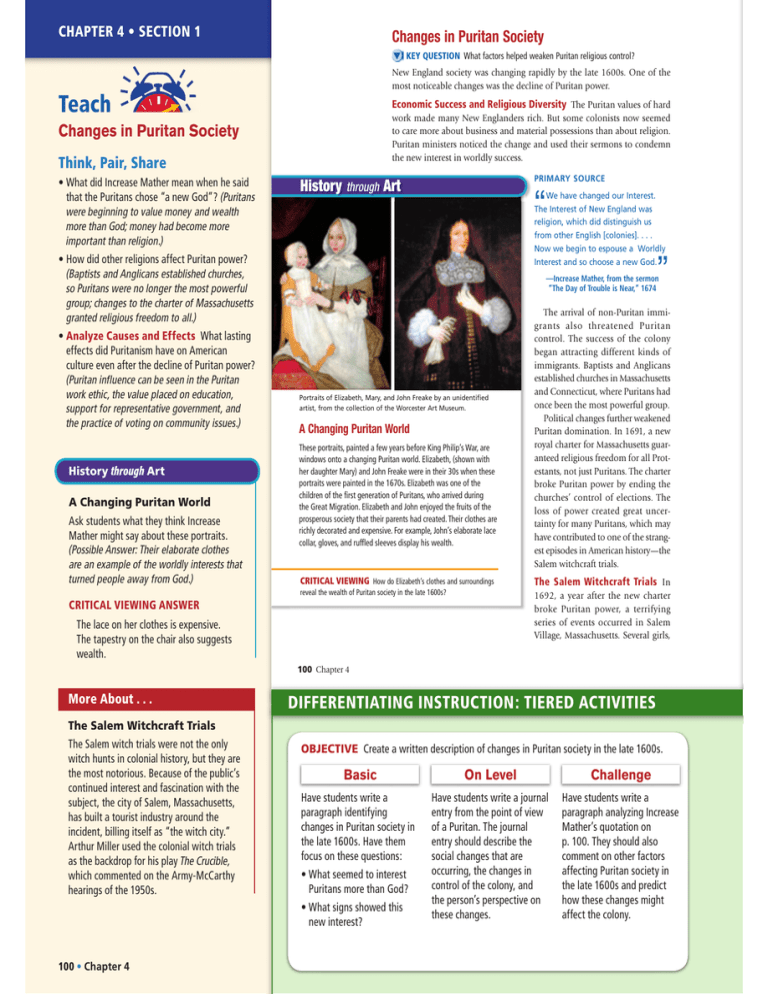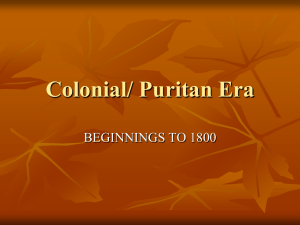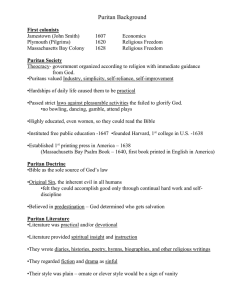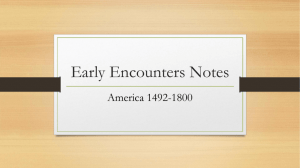Ch. 4.1 Part 4 - Lancaster City Schools
advertisement

CHAPTER 4 • SECTION 1 Changes in Puritan Society KEY QUESTION What factors helped weaken Puritan religious control? New England society was changing rapidly by the late 1600s. One of the most noticeable changes was the decline of Puritan power. Teach Economic Success and Religious Diversity The Puritan values of hard work made many New Englanders rich. But some colonists now seemed to care more about business and material possessions than about religion. Puritan ministers noticed the change and used their sermons to condemn the new interest in worldly success. Changes in Puritan Society Think, Pair, Share • What did Increase Mather mean when he said that the Puritans chose “a new God”? (Puritans were beginning to value money and wealth more than God; money had become more important than religion.) History through PRIMARY SOURCE Art “ We have changed our Interest. The Interest of New England was religion, which did distinguish us from other English [colonies]. . . . Now we begin to espouse a Worldly Interest and so choose a new God. • How did other religions affect Puritan power? (Baptists and Anglicans established churches, so Puritans were no longer the most powerful group; changes to the charter of Massachusetts granted religious freedom to all.) • Analyze Causes and Effects What lasting effects did Puritanism have on American culture even after the decline of Puritan power? (Puritan influence can be seen in the Puritan work ethic, the value placed on education, support for representative government, and the practice of voting on community issues.) History through Art A Changing Puritan World Ask students what they think Increase Mather might say about these portraits. (Possible Answer: Their elaborate clothes are an example of the worldly interests that turned people away from God.) ” —Increase Mather, from the sermon “The Day of Trouble is Near,” 1674 Portraits of Elizabeth, Mary, and John Freake by an unidentified artist, from the collection of the Worcester Art Museum. A Changing Puritan World These portraits, painted a few years before King Philip’s War, are windows onto a changing Puritan world. Elizabeth, (shown with her daughter Mary) and John Freake were in their 30s when these portraits were painted in the 1670s. Elizabeth was one of the children of the first generation of Puritans, who arrived during the Great Migration. Elizabeth and John enjoyed the fruits of the prosperous society that their parents had created. Their clothes are richly decorated and expensive. For example, John’s elaborate lace collar, gloves, and ruffled sleeves display his wealth. CRITICAL VIEWING How do Elizabeth’s clothes and surroundings reveal the wealth of Puritan society in the late 1600s? CRITICAL VIEWING ANSWER The lace on her clothes is expensive. The tapestry on the chair also suggests wealth. The arrival of non-Puritan immigrants also threatened Puritan control. The success of the colony began attracting different kinds of immigrants. Baptists and Anglicans established churches in Massachusetts and Connecticut, where Puritans had once been the most powerful group. Political changes further weakened Puritan domination. In 1691, a new royal charter for Massachusetts guaranteed religious freedom for all Protestants, not just Puritans. The charter broke Puritan power by ending the churches’ control of elections. The loss of power created great uncertainty for many Puritans, which may have contributed to one of the strangest episodes in American history—the Salem witchcraft trials. The Salem Witchcraft Trials In 1692, a year after the new charter broke Puritan power, a terrifying series of events occurred in Salem Village, Massachusetts. Several girls, 100 Chapter 4 More About . . . DIFFERENTIATING INSTRUCTION: TIERED ACTIVITIES The Salem Witchcraft Trials The Salem witch trials were not the only witch hunts in colonial history, but they are the most notorious. Because of the public’s continued interest and fascination with the subject, the city of Salem, Massachusetts, has built a tourist industry around the incident, billing itself as “the witch city.” Arthur Miller used the colonial witch trials as the backdrop for his play The Crucible, which commented on the Army-McCarthy hearings of the 1950s. OBJECTIVE Create a written description of changes in Puritan society in the late 1600s. Basic On Level Challenge Have students write a paragraph identifying changes in Puritan society in the late 1600s. Have them focus on these questions: Have students write a journal entry from the point of view of a Puritan. The journal entry should describe the social changes that are occurring, the changes in control of the colony, and the person’s perspective on these changes. Have students write a paragraph analyzing Increase Mather’s quotation on p. 100. They should also comment on other factors affecting Puritan society in the late 1600s and predict how these changes might affect the colony. • What seemed to interest Puritans more than God? • What signs showed this new interest? 100 • Chapter 4 CHAPTER 4 • SECTION 1 pretending to be bewitched, began accusing others of witchcraft. Hysteria spread through the community. Those accused were forced to name others as witches. More than 100 people were arrested and dozens were tried. Of those, 19 were found guilty and put to death by hanging, including a popular minister. In addition, two dogs were hanged, and a man was pressed to death when he refused to cooperate with the court. Eventually, important ministers intervened, and the governor stopped the executions. Within a few years, several of the accusers admitted that they had made false accusations. In 1697 one of the judges begged public forgiveness for his part in the trials. CONNECT What factors allowed each colonial region to grow and prosper? Ask students what they have learned so far that can help them answer this question. Students might mention: • New England developed shipbuilding, fishing, and shipping and grew rich through international trade. Puritan Legacy Although Puritan power declined, Puritan values survived. These values have influenced American culture. Americans have inherited: • the Puritan work ethic • a high regard for education • opposition to royal power and support for representative government • the practice of voting on decisions affecting the community Many of these Puritan values helped put America on the road to independence. CAUSES AND EFFECTS Describe how Puritan religious control was weakened in the later 1600s. Answer: Commerce became more important than religion. Religious diversity increased. • Colonists overcame threats from Native Americans through King Philip’s War. An elderly women being arrested for witchcraft in Salem Why do you think the girls accused so many people of witchcraft? • The Puritan work ethic continued even after Puritan power declined. Answer: Perhaps they wanted to divert attention away from themselves. 4 Section Assessment For test practice, go to Interactive Review @ ClassZone.com TERMS & NAMES 1. Explain the importance of • Backcountry • Navigation Acts • triangular trade • King Philip’s War USING YOUR READING NOTES 2. Causes and Effects Complete the diagram you started at the beginning of this section to show the causes and effects of the Navigation Acts. Cause England wanted to profit from colonial trade. Cause Effect Navigation Acts Effect Unit 2 Resource Book • Section Quiz, p. 121 KEY IDEAS 3. How did England profit from colonial shipping? 4. What changes did prosperity bring to New England? Interactive Review @ ClassZone.com CRITICAL THINKING 5. Make Inferences How do you think the enslaved were able to save money if they were not paid for their labor? 6. Connect Economics & History Why did New England come to depend on fishing and shipbuilding? 7. Assess & Reteach Assess Have students complete the Section Assessment. ONLINE QUIZ 1 to the Essential Question Power Presentations Test Generator Reteach Group students into four teams. Assign one part of the section to each team. Have each group create a poster that tells what factors allowed the colonies to grow and prosper. Have groups display their posters, then have each student write a summary of factors that allowed New England to grow. Connect to Today New Englanders took economic advantage of their environment. Describe modern examples of people using natural resources to gain wealth. 8. Writing Letter Write a letter from Metacom to the English colonists. Explain the reasons for the war that is about to be launched against them. Unit 2 Resource Book • Reteaching Activity, p. 125 The Colonies Develop 101 SECTION 1 ASSESSMENT ANSWERS Terms & Names 1. Backcountry, p. 95; triangular trade, p. 98; Navigation Acts, p. 97; King Philip’s War, p. 99 Using Your Reading Notes 2. Cause—Coastal towns grew rich; Effects— Colonists resented the Acts; merchants ignored the Acts; smuggling and piracy grew. Key Ideas 3. England passed the Navigation Acts to ensure it made money from colonial trade—for example, by taxing any colonial goods not shipped to England. 4. Colonists became more concerned with worldly goods than with religion. Critical Thinking 5. They might have sold items for money, which they then saved. 6. New England had many ports near good fishing grounds and forests that provided materials for shipbuilding. 7. Possible Answer: Saudi Arabia and other countries gain wealth from oil. 8. Letters should be written from Metacom’s point of view and should explain the conflict over land between Native Americans and the colonists. Use the rubric to score students’ letters. Letter Rubric Content Mechanics 4 excellent; addresses all important points no errors 3 good; addresses some important points few/minor errors 2 fair; addresses few important points several errors 1 poor; addresses no important points many errors Teacher’s Edition • 101





